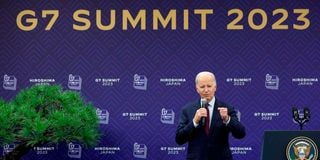G7 communique amps up pressure on China, Russia

US President Joe Biden speaks during a press conference following the G7 Leaders' Summit in Hiroshima on May 21, 2023.
The Group of Seven industrial powers Saturday amplified its denunciation of China’s rising military and economic security threats, while urging Beijing to press Russia to stop its military aggression and withdraw its troops from Ukraine.
In a communique of the G-7 summit in Hiroshima, the group criticized China for its use of “economic coercion,” militarization of the South China Sea and “interference activities” aimed at undermining the safety of diplomats, the integrity of democratic institutions and economic prosperity.
Again, the G-7 vowed to “support Ukraine for as long as it takes in the face of Russia’s illegal war of aggression.”
The group, which is made up of the United States, United Kingdom, Canada, France, Italy, Japan and the European Union, said its approaches are not designed to harm China nor thwart its economic progress and development.
It called on Beijing to engage with the G-7 on climate, debt restructuring of vulnerable countries, global health and macroeconomic stability.
“We are not decoupling or turning inwards,” the communique said. “At the same time, we recognize that economic resilience requires de-risking and diversifying. We will take steps, individually and collectively, to invest in our own economic vibrancy. We will reduce excessive dependencies in our critical supply chains.”
The group reiterated concerns about the situation in the East and South China Seas, and it encouraged Beijing to support a “comprehensive, just and lasting peace” in Ukraine.
The statement marks the strongest criticism of Beijing by the group since the 2021 G-7 summit in Cornwall, U.K., when China was mentioned for the first time. The relatively mild language calling for a “peaceful solution” and opposing “unilateral attempts to change the status quo” in Taiwan, however, showed a compromise between G-7 members — some of whom are uncomfortable about being too pointed on this issue, including French President Emmanuel Macron.
“The worst thing would be to think that we Europeans must become followers on this topic and take our cue from the U.S. agenda and a Chinese overreaction,” Macron said in April.
Economic coercion
Earlier Saturday G-7 leaders unveiled the “Coordination Platform on Economic Coercion,” a new framework for countering the use of punitive trade practices for political goals. The framework is understood to target China without specifically naming the country.
In a statement, the G-7 said the framework will increase the group’s “collective assessment, preparedness, deterrence and response,” to “explore coordinated responses, deter and, where appropriate, counter economic coercion,” in accordance with their respective legal systems.
“These economic security tools will include steps to build resilience in our supply chains. They will also include steps to protect sensitive technology like export controls and outbound investment measures,” White House national security adviser Jake Sullivan said Saturday during a press briefing in Hiroshima.
The framework targets the most advanced technologies rather than placing broad restrictions on Western technology exports.
From Beijing, a Chinese Foreign Ministry spokesperson on Friday responded to the planned measures. “If the G-7 summit wants to discuss the issue of economic coercion it might as well first discuss how the United States coerces the other six member states,” he said.
In a statement released Saturday, The Chinese Foreign Ministry spokesperson criticized the G-7 joint statement out of Hiroshima and complained to host Japan.
"The G-7 makes high-sounding claims about 'promoting a peaceful, stable and prosperous world,' but what it does is hindering international peace, undermining regional stability and curbing other countries’ development," he said in the statement. "As for 'economic coercion,' the massive unilateral sanctions and acts of 'decoupling' and disrupting industrial and supply chains make the U.S. the real coercer that politicizes and weaponizes economic and trade relations. We urge the G-7 not to become an accomplice in economic coercion."
Belt and Road alternative
On the sidelines of the summit, G-7 leaders and invited guests, including President Joko Widodo of Indonesia, President Azali Assoumani of Comoros, and Prime Minister Mark Brown of the Cook Islands, participated in the Partnership for Global Infrastructure and Investment, or PGII, event.
The global infrastructure plan to support lower- and middle-income countries was initially launched as “Build Back Better World,” at the G-7 Cornwall as an alternative to China’s development juggernaut Belt and Road Initiative.
The plan was relaunched as PGII at the G-7 summit in Elmau, Germany, in 2022.
Under PGII, G-7 countries aim to mobilize $600 billion in global infrastructure investment by 2027.
Global South
Brazil, Comoros, Cook Islands, Indonesia, South Korea, Ukraine and Vietnam were invited by summit host Japanese Prime Minister Fumio Kishida as part of his outreach effort to the Global South.
Many countries in the Global South are dealing with unsustainable debt levels, much of it from high-interest Chinese infrastructure loans. When the high-debt levels are coupled with the impact of the COVID-19 pandemic and rising food and energy prices caused by the war in Ukraine, many observers worry these conditions could lead to a financial collapse in some countries.
Their inclusion is indicative of the group’s realization that this can't just be a narrow G-7 conversation on sanctioning Russia, said Sheila Smith, Council on Foreign Relations expert on Japanese foreign policy.
“It has to be a larger conversation on the global systemic consequences of Russia's aggression,” Smith told VOA. Without having to get “everybody to condemn Russia or to buy into sanctions,” she noted.
Kishida also invited prime ministers of India and Australia and convened them for the Quad meeting, which originally was scheduled early next week in Sydney but was preempted by negotiations in Washington to avoid a U.S. default and raise the country’s debt ceiling.
VOA’s Paris Huang contributed to this report.





